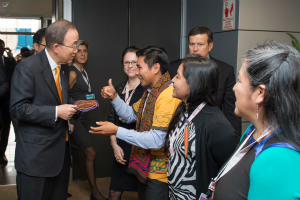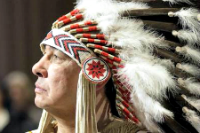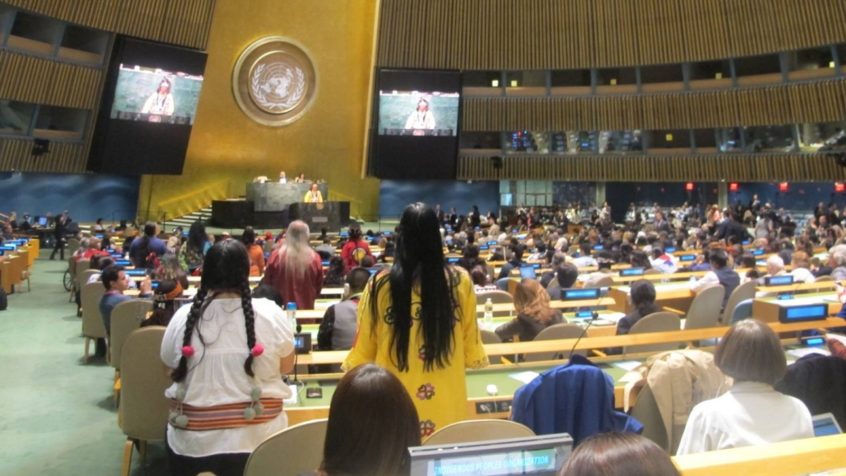Secretary General’s Message to UN Country Teams
Secretary-General calls on UN Country Teams to put Indigenous Peoples at the centre
Following the adoption of the 2030 Agenda, the UN Secretary-General Ban Ki-moon has at several occasions been calling on UN Country Teams to put indigenous peoples as a top priority in the implementation of the Agenda.
“If the United Nations doesn’t care, then who will care? … It is our moral responsibility” Secretary-General Ban Ki-moon to UNCTs
Below are the highlights from the Secretary-General’s recent statements – as inspiration to UN Country Teams on how to support Member States in ensuring the rights of indigenous peoples.
Why focus on indigenous peoples?
 All over the world, indigenous peoples face exclusion, discrimination and multiple challenges not only socio-economically, but also in terms of threats to their cultures, languages and identity. Indigenous peoples should therefore be part of the United Nations’ core work. “If the United Nations doesn’t care, then who will care?”, the Secretary-General asked, emphasising that it is the United Nations’ moral responsibility to act. Video: The Secretary-General calls for UN colleagues’ commitment
All over the world, indigenous peoples face exclusion, discrimination and multiple challenges not only socio-economically, but also in terms of threats to their cultures, languages and identity. Indigenous peoples should therefore be part of the United Nations’ core work. “If the United Nations doesn’t care, then who will care?”, the Secretary-General asked, emphasising that it is the United Nations’ moral responsibility to act. Video: The Secretary-General calls for UN colleagues’ commitment
The global framework for leaving no one behind
The Sustainable Development Goals (SDGs) provide an improved framework to work on indigenous peoples’ issues compared to the Millennium Development Goals, where indigenous peoples were almost invisible. The 2030 Agenda also reflects a strong commitment by world leaders to confront inequality, marginalization and to leave no one behind. The United Nations has an important role to play in making this a reality for indigenous peoples. Video: The Secretary-General calls for indigenous peoples to be included in the 2030 Agenda and Video: The Secretary-General encourages Member States to take action on the SDGs.
“I really count on your strong commitment in this” Secretary-General Ban Ki-moon
The recognition of indigenous peoples
The recognition of indigenous peoples varies from country to country, and region to region. There are some governments who do not recognise the existence of indigenous peoples. However, a comprehensive international framework is in place, providing for the recognition of indigenous peoples’ rights. This includes: the United Nations Declaration on the Rights of Indigenous Peoples adopted by the General Assembly in 2007; the Special Rapporteur on the Rights of Indigenous Peoples, the Expert Mechanism on the Rights of Indigenous Peoples, and the Permanent Forum on Indigenous Issues. “We have the system, but how to make this system move and implemented, that is more important”, underscored the Secretary-General. Video: The Secretary-General speaks about indigenous peoples’ recognition.
The tools available to UN Country Teams
The basis for UN Country Teams’ support to Member States on indigenous issues is the United Nations Declaration on the Rights of Indigenous Peoples (2007), which establishes a universal framework of minimum standards for the survival, dignity, well-being and rights of the world’s indigenous peoples. To support the implementation of the Declaration, the UN Development Group in 2008 adopted specific guidelines to assist the UN system to mainstream indigenous peoples’ issues into the operational activities and programmes at the country level. In addition to the Declaration, the ILO Convention No. 169 on Indigenous and Tribal Peoples and the Outcome Document from the 2014 World Conference on Indigenous Peoples provide further guidance.
The UN system working as one
 The Secretary-General also emphasised how important it is to mobilise the entire UN system to work together. In regards to indigenous peoples’ issues, a system-wide action plan has been developed with the specific objective of enhancing coherence and coordination within the UN system. “What I am really asking you, is that we should break the normal attitude of working in silos and avoid duplications… You must think as one, act as one and deliver as one. This is the best way to fully utilise our limited resources,” said the Secretary-General, also encouraging the World Bank and IMF to be part of that process together with UN Country Teams. Video: The Secretary-General speaks on UN delivering as one.
The Secretary-General also emphasised how important it is to mobilise the entire UN system to work together. In regards to indigenous peoples’ issues, a system-wide action plan has been developed with the specific objective of enhancing coherence and coordination within the UN system. “What I am really asking you, is that we should break the normal attitude of working in silos and avoid duplications… You must think as one, act as one and deliver as one. This is the best way to fully utilise our limited resources,” said the Secretary-General, also encouraging the World Bank and IMF to be part of that process together with UN Country Teams. Video: The Secretary-General speaks on UN delivering as one.
The UN system working all year round
The Secretary-General emphasised the role of the Permanent Forum on Indigenous Issues and its annual session which brings together indigenous peoples, Member States and UN agencies, programmes and funds. While always attending and acknowledging the importance of the annual sessions, the Secretary-General calls on the UN family to work on indigenous peoples’ issues as a matter of priority throughout the year and at all levels.
Reaching out to the UN Secretariat
The Secretariat of the Permanent Forum on Indigenous Issues, Division of Social Policy and Development, UN Department of Economic and Social Affairs provides support to the UN system, including UN Country Teams, with information, technical and policy advice, facilitation of capacity building and/or national policy dialogues to ensure that the UN Declaration for the Rights of Indigenous Peoples is implemented. Read some of the recent accounts from the UN Secretariat’s visits and support to UN Country Teams from El Salvador and Peru. Or contact the Secretariat for more information.


